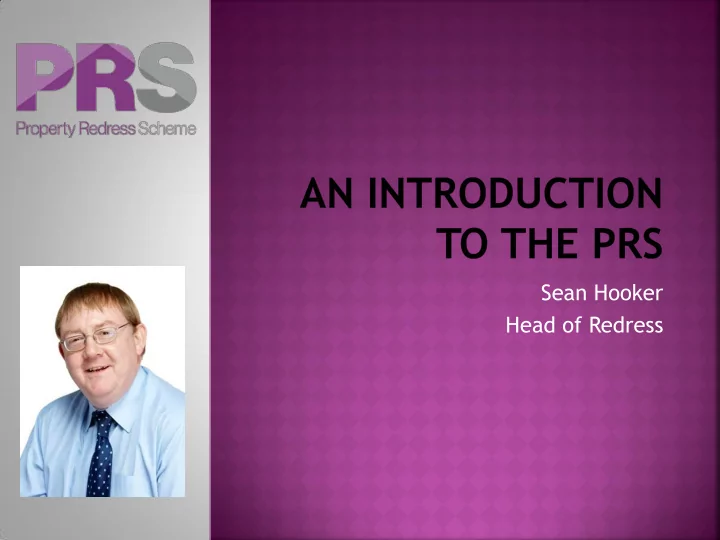

Sean Hooker Head of Redress
2013 Enterprise and Regulatory Reform act it is now compulsory for all Letting Agents and Property Managers Lettings now on par with Sales Three authorised schemes
“lettings agency work” means things done by any person in the course of a business in response to instructions received from —
Either: A person seeking to find another person wishing to rent a dwelling-house in England under a domestic tenancy and, having found such a person, to grant such a tenancy (“a prospective landlord”)
Or: A person seeking to find a dwelling-house in England to rent under a domestic tenancy and, having found such a dwelling-house, to obtain such a tenancy of it (“a prospective tenant ”). Or both
Register as a member 1. Entry Enhanced Complete joining form 2. No preconditions No compulsory insurances No code or qualifications required Pay appropriate joining fee 3.
Verification and conformation of membership Membership Pack Certificate of Membership and Member Number Terms of Reference Window sticker for each branch Listed on our website
Improved practices Improved reputations Safer Letting industry Fewer “rogue” agents
Failure to join a scheme and comply with the law Heavy fines; and/or Closure
Breaches of law and poor delivery of standards Referral to ombudsman to make binding decisions Awards of up £25,000
Failure to comply with our Terms of Reference with an award Fines Expulsion from scheme Share information with other schemes ‘Name and Shame’ of incompetent/offending agents and landlords
Nobody likes complaints – awkward for all parties! Complaints can lead to stronger relations, trust and improved services You take complaints seriously
Any customer Including prospective landlords Property Management Services Landlords and tenants cannot use to complain about each other Block management Lease holders, tenants and sometimes free holder Sales Buyers and sellers
A breach of the Member’s obligations under the law; Where legal rights have been impinged or breached; Where a Member has not acted in accordance with a Code of Practice it has signed up to, or any internal rules, procedures or statements of practice; Unfair treatment of the complainant by the Member; including, but not limited to: rudeness or discourtesy i. not explaining matters ii. poor or incompetent service iii. avoidable delays. iv. Where a Member has not administered a transaction as efficiently as would be expected. We will not deal with tenancy deposit disputes.
Step One: Private resolution? Inform customer of your complaint process and fair estimated response times Inform customer they can refer to the PRS if they are not satisfied If customer immediately refers to us, we will give you 10 working days to provide your final response, with our assistance if necessary If you believe the complaint is resolved we will seek confirmation We will never charge for this stage
Step Two: If the customer remains dissatisfied, we will try and facilitate an agreement Telephone mediation to attempt to bring both sides to agreement If this succeeds, there may be a reduced charge for our service. We issue a written confirmation of resolution which can be used as evidential proof of agreement once signed by both parties
Step Three: Formal adjudication by Ombudsman (Head of Redress) Both parties are given an opportunity to provide supporting evidence The Head of Redress will make a formal decision and issue in writing If complainant confirm they accept the decision it is made binding If complainant does not accept they must seek further resolution through the courts Only at this stage do we require a full complaints charge
Simple and affordable solution Business development Online resources and training
Voluntary redress for property professionals in Scotland, Wales and Northern Ireland Voluntary redress for suppliers and services in the letting industry such as: inventory clerks; cleaners; and maintenance operatives. Our Partnerships
Recommend
More recommend